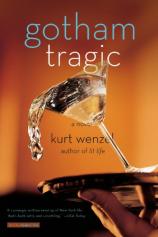Reading Group Guide
Discussion Questions
Gotham Tragic: A Novel

1. Kyle Clayton absolutely loves being despised. Scorn, he believes, is a signifier of success in New York City: the more you receive, the more successful you are. Is there a grain (or more) of truth in this idea? Have you ever been despised after inflaming the "jealousies of the successful" or highlighting the "failures of the leftbehind"? Did a small part of you revel in the contempt?
2. There are certain undeniably satirical elements in Gotham Tragic. But would you characterize the novel as a true satire? Why or why not?
3. Susan and Don Westly are obviously quite rich. Still, Susan bemoans the fact that they are no longer the richest family in their neighborhood, and she urges Don to make more money. What does Gotham Tragic reveal about American excess or about excess in general?
4. In George Bernard Shaw's play Pygmalion, Henry Higgins tries to pass off a poor flower girl named Eliza Doolittle as a duchess. He succeeds, but Eliza contends that the success of the ruse has very little to do with the rigorous training she underwent. She tells another character that "the difference between a lady and a flower girl is not how she behaves but how she's treated. I shall always be a flower girl to Professor Higgins because he always treats me like a flower girl and always will; but I know I can be a lady to you because you always treat me as a lady and always will." What role does this "Pygmalion effect" play in Gotham Tragic? Are Kyle Clayton and Erin Wyatt victims of expectation?
5. There are a host of despicable characters in Gotham Tragic. Did you ever find your sympathies gravitating to characters who are somewhat less than savory? Who? Defend your favorite bad boy (or girl).
6. Some of us in the United States have difficulty understanding the nuances of Islam and the complex relationships that Muslim Americans have with their country. Did reading Gotham Tragic help to broaden your understanding of these subjects?
7. Ayla is one of the most complex characters in this book. How does the tension between duty and personal choice affect her life?
8. Kyle obviously loves Ayla very much; he makes compromises with her, and the two share numerous remarkably tender moments. So how do you explain his numerous indiscretions? Is Kyle's transformation believable?
9. City restaurant pulsates with energy throughout Gotham Tragic. How would you describe the role the restaurant plays in the novel? Is it more than a mere setting for the action? Is it a microcosm of New York City? Why or why not?
10. Kurt Wenzel's work has been compared to that of Bret Easton Ellis, Tom Wolfe, and Zadie Smith. How apt do you consider these comparisons?
Gotham Tragic: A Novel
- Publication Date: July 11, 2005
- Paperback: 336 pages
- Publisher: Back Bay Books
- ISBN-10: 0316010774
- ISBN-13: 9780316010771






